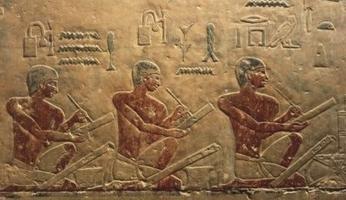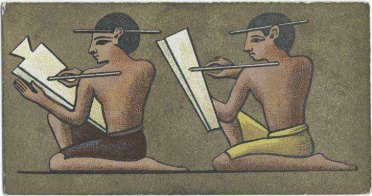After the hearing lecture this morning and reading the article about Alexander and the horse the main thing that stick in my mind is how different people may view or retell history. Was Alexander a great and infinitely powerful ruler? Or was Alexander a ruthless destruction minded tyrant? Well that depends on who you ask or where you read it from. For example the primary source about Alexander and the horse and rest of his life appears to be written by a Greek. The source portrays Alexander in a very positive light. The taming of the wild horse in ways portrays that he is one of a kind and destined for greatness. Also how he goes on an epic conquest to take land from the barbarians. Yet this article neglects the fact after he took up the throne he murdered his entire family. And that he declared war on nations for the soul purpose of taking them over. He sacked cities and then burned them to the ground. Yet none of this is mentioned in the article about Alexander’s life. This seem like large events to leave out. In conclusion I think that history can be very opinionated depending on what sources and stories stand the test of time.
propaganda
The Polity of Spartans
Although I had always heard the Spartan’s were incredible warriors, I never realized all of the labor they were forced into. In the past, I had assumed that these men were naturally stronger, but after reading this article, I realized that for some of these people, they may have been forced into becoming something that they did not want. Not only were they not allowed to wear shoes, they were also whipped if they misbehaved. Even though they were a part of a strong empire, some of the Spartan men must have been unhappy with the positions they were forced to fill because of the harshness of the rule. For example, in order to train soldiers to work on an empty stomach and to keep them from bloating, they would not feed them. The only time they would be fed was
“to avoid bloating and yet not remain unacquainted with the pains of starvation”.
Not only would he keep them from eating, but he also did not allow them any privacy because he felt that it hindered their performances as soldiers. Lycurgos made living conditions awful for these soldiers, and for those who were not 100% loyal to the Spartans, they could be seen as slaves. They were forced to work because if they did not, they faced severe punishment. Although Lycurgos made his soldiers work extremely hard, there is no evidence that he suffered any hardships during these times. Since he was able to become the lawmaker, he did what he had to do, even if that meant forceful labor from his citizens.
Wannabe
There has been, in many ways, a lot of controversy surrounding the belief that Peter the Great made the right choices on his campaign to make Russia an empire. By this I mean the direction he wanted Russia and its people to go to reach a modernized empire. The direction would be to mirror much of what other parts of Europe (Sweden, Italy, England) were doing. On quote in particular from the secondary source Peter the Great says what I am trying to say. Continue reading
Peter The Great
 Throughout history, for every country you have great hero’s and leaders. Growing up in the United States I have been lucky to learn about so many influential and polarizing leaders such as George Washington, Abraham Lincoln, and FDR just to name a few. With Modern Russian History, I have been able to learn about one of Russia’s greats leaders this past week. Peter The Great is a controversial leader when being discussed by some Russians. Continue reading
Throughout history, for every country you have great hero’s and leaders. Growing up in the United States I have been lucky to learn about so many influential and polarizing leaders such as George Washington, Abraham Lincoln, and FDR just to name a few. With Modern Russian History, I have been able to learn about one of Russia’s greats leaders this past week. Peter The Great is a controversial leader when being discussed by some Russians. Continue reading
Instructions to an apprentice scribe

In my life, I have heard, seen, and read propaganda thousands of times, and will do so thousands of times more. It is as much a daily part of my life as eating a meal, or using the bathroom, or reading a book before bed. And yet, I do not believe that I have ever read something as persuasive (and violently true) as these instructions were to the apprentice scribe.
These days, propaganda appeals to our sense of justice, our ethics, our morals, and our wants, in ways that would please us in a subtle way. Many instances are cheerful, and include overcoming a hurdle to become a better person. Yet other instances tug at our sympathy, and only ask that we give a little to save a lot, something small for so much good.

These instructions, however, practically hit you over the head with how awful every other profession is, and then claim that all of this can be avoided, if you were to only become a scribe. They describe other avenues of work, and all the labor, toil, and injury that can come of it. They use fear and harsh words to scare the potential scribes, and then extol their skills to convince them of their perfect ability to become a scribe.
When [the peasant] reaches his field he finds [it?] broken up. He spends time cultivating, and the snake is after him. It finishes off the seed as it is cast to the ground. He does not see a green blade. He does three plowings with borrowed grain. His wife has gone down to the merchants and found nothing for barter. Now the scribe lands on the shore. He surveys the harvest. Attendants are behind him with staffs, Nubians with clubs. One says [to him]: “Give grain.” “There is none.” He is beaten savagely. He is bound, thrown in the well, submerged head down. His wife is bound in his presence. His children are in fetters. His neighbors abandon them and flee. When it is over, there is no grain.
If you have any sense, be a scribe. If you have learned about the peasant, you will not be able to be one. Take note of it!
To me, this is a somewhat shocking, yet scarily effective way of persuading a person to do what they would normally avoid [become a scribe]. Show them the wrong in everything else [labor, toil, injuries, thankless work, no wealth], appeal to their ego and greed [perfect to be a scribe, make tons of money and keep it], and assure them that all of the problems in the other fields of work do not apply [to those who are scribes].
Be a scribe, and be spared from soldiering! You call and one says: “Here I am.” You are safe from torments. Every man seeks to raise himself up. Take note of it!
Sample Post
This is a sample post. Each week, students will write 150-500 words responding to one or more of the readings assigned that week. Students may compare the readings, try to draw larger conclusions from the historical example of primary sources, or examine something they found surprising about a reading. Simply describing or re-phrasing the information in the reading will not be sufficient. More after the jump… Continue reading